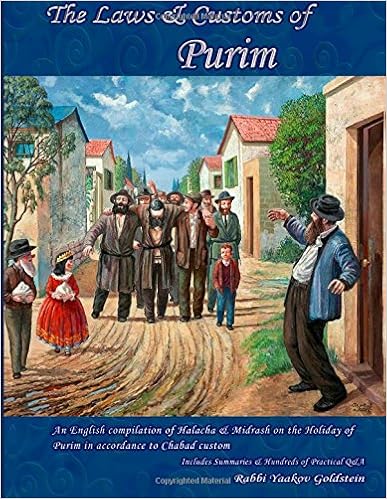This article is an excerpt from our Sefer

Buy me on Amazon.com
Who is obligated?
Women: [1] Both men and women are obligated in the Mitzvah of Matanos Laevyonim, to give a present to two paupers.
Married women:[2] Married women are to be stringent[3] to give Matanos Laevyonim on behalf of themselves, in addition to the Matanos Laevyonim sent by their husband. [Thus their husband is to give his wife permission to distribute her personal Matanos Laevyonim.[4] She is not to rely on her husband sending the Matanos Laevyonim for her.[5] She is rather to distribute it herself.[6]]
Family members:[7] All family members must send their own personal Matanos Laevyonim and cannot rely on their parents, even if they are still being supported by them and live in their home. [If they do not have any money of their own, it is proper for the father of the household to give them money in order to fulfill the Mitzvah.[8]]
Children: Children above the age of Chinuch are to be educated to give Matanos Laevyonim.[9] [If one is in doubt as to whether the child has reached the age of Chinuch one is to be stringent.[10]]
Must a pauper give Matanos Laevyonim? Many Poskim[11] rule that even one who is poor and lives off charity, must fulfill the Mitzvah of Matanos Laevyonim by giving a present to two other paupers. However other Poskim[12] argue that a pauper is exempt from giving Matanos Laevyonim. Practically we rule like the first opinion.[13] The pauper may simply switch his meal[14] [or whatever money he has] with another two paupers to fulfill his obligation.[15]
Q&A
If someone gives Matanos Laevyonim on behalf of someone else does that person fulfill his obligation?[16]
Yes. Even if that person did not have knowledge that a donation was given on his behalf, he nevertheless fulfills his obligation.
[1] Rama 695/4; Michaber 694/1: “Every person is obligated”
[2] M”A 695/14; Elya Raba 695/13; Chayeh Adam 154/33; M”B 695/25; Kitzur SHU”A 142/4; Kaf Hachaim 695/56
Background:
The M”A ibid writes he has not seen women being careful to give Mishloach Manos Matanos Laevyonim of their own. He therefore suggests that perhaps only widows are obligated while married women are exempt as they rely on their husbands. Nevertheless he concludes one is to be stringent and so conclude all the above Poskim. The Chasam Sofer 196 explains the question as follows: According to the Terumos Hadeshen the main reason of Mishloach Manos [and Matanos Laevyonim] is to increase in food for the Purim meal, hence since married women eat by their husbands they are exempt from Mishloach Manos. However according to the reason of the Manos Levi that its purpose is to increase friendship also married women would be obligated.
Other Poskim: See Aruch Hashulchan 694/2 that we apply the rule of a wife is like her husband’s body and she hence fulfills her obligation with her husband.
[3] However single women are obligated to give from the letter of the law as explained above. [Kaf Hachaim 695/57]
[4] Kaf Hachaim 695/56; Piskeiy Teshuvos 695 footnote 75 writes that seemingly she must acquire the money from her husband with a legal acquisition.
[5] Kitzur SH”A 142/4 based on wording in M”A ibid. This ruling of the Kitzur can be understood in one of two ways: 1. That she should not assume that her husband has her in mind and is rather to explicitly make sure that he is sending also for her. 2. Her husband is not to distribute the Matanos Laevyonim for her at all, and rather she is to distribute her the money directly. The reason for this latter understanding is because if the husband sends it for her she has never acquired it from him and it is thus not considered as if she sent the money. [See Piskeiy Teshuvos 695/15 footnotes 75-76; Halichos Beisa 24 footnote 75 in name of Rav SZ”A.]
[6] Piskeiy Teshuvos 695/15 based on Kitzur SH”A in second explanation in previous footnote
[7] Aruch Hashulchan 695/2; Shaareiy Halacha Uminhag 2/292; Likkutei Sichos Vol. 2 Hosafos
Other Poskim: Some Poskim rule that all children that do not earn their own money are not obligated to give Matanos Laevyonim. [Kinyan Torah 1/132]
[8] Chanoch Lanaar 27 footnote 7; Piskeiy Teshuvos 695/15
[9] P”M 695 A”A 14; Siddur Yaavetz; Shaareiy Halacha Uminhag 2/292; Lekutei Sichos Vol. 2 Hosafos; Aruch Hashulchan 6954/2; Piskeiy Teshuvos 695/15
Other Poskim: Some Poskim rule children are not obligated to give Matanos Laevyonim being they do not have any money of their own. [Ashel Avraham Butchach 695; Kinyan Torah 1/132]
[10] Shaareiy Halacha Uminhag 2/292; Likkutei Sichos 11 p. 322; Sdei Chemed Kelalim Samech 30;43
[11] Bach; Taz 694/1; Elya Raba 694/1; Mateh Yehuda 694; Birkeiy Yosef 694/2; Machazikei Bracha 694/1; Nehar Shalom 694/1; Chayeh Adam 155/28; M”B 694/1
[12] Peri Chadash 694
[13] Kaf Hachaim ibid
[14] Meaning that he gives each pauper his meal and they give him back a meal. The same would apply with money that he gives them a dollar and they give him back a dollar.
[15] Mateh Yehuda 694; P”M 694 M”Z 1; Yifei Lev 2 694/17; Ben Ish Chaiy Titzaveh 15; M”B 694/2
[16] Aruch Hashulchan 696/3; Piskeiy Teshuvos 694/9


Leave A Comment?
You must be logged in to post a comment.